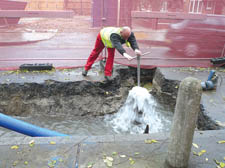|
|
 |
| |

‘Companies should not be allowed to dig holes without the consideration of road users’ |
It’s time for greater regulation
to tackle spectre of roadworks
Utility companies should not be allowed to dig holes when they see fit, argues
Danny Chalkley
ROADWORKS are the blight of every modern city, particularly one the size of London, with residents, visitors and businesses all caught up in the ensuing traffic chaos.
Currently, local authorities only have limited powers to control where, when and for how long roads are dug up – regardless of the disruption they cause. But this blight on our roads has to end and we need the powers to tackle shoddy works effectively once and for all.
It is estimated there are around one million holes dug in London’s roads each year, with little or no regulation. Most utility companies need only provide a short notice period before forthcoming works, with 90 per cent carried out with less than 10 days’ notice to the highway authority. It is ridiculous that a street can be dug up countless times despite the impact and inconvenience this causes people.
We will not tolerate what this does to our capital. Westminster has already brought a number of utility companies who delayed road works, to account. Last year alone, we fined companies almost £150,000 in total for failing to complete road works on time.
On Monday, Victoria Street fell victim to yet more utilities works. The works will take place for eight weeks, causing yet more traffic misery for thousands of motorists who use the capital’s congestion charge-free through route each day.
Deliveries will be affected, journey times in and around the area will be extended and surrounding roads will take the brunt of traffic diverting through alternative routes. Enough is enough. The cost to businesses caused by unnecessary delays runs into millions. Londoners should not suffer due to the poor planning of a handful of utilities who can currently hold us to ransom.
While we understand the need for roadworks, they need to be regulated. Utility companies should not be allowed to dig holes when they see fit, without the consideration of other road users.
In July, Westminster Council, together with 17 other London boroughs and Transport for London, applied to the Secretary of State for Transport for the powers to co-ordinate road works through a permit scheme.
Our plan is to allow councils to regulate when roadworks can take place. We will be able to organise and create a schedule for works so that less overlapping work takes place, and in addition councils will be able to impose conditions of work upon the utilities companies.
Emergency services should benefit from quicker journeys, buses should be able to operate more reliably and businesses should see their goods being delivered faster.
The final decision rests with the Secretary of State for Transport.
If he gives the scheme the go ahead, there should be a reduction in disruption caused by roadworks in central London, because for the first time local councils will be able to control when roadworks are undertaken.
We want to be proud of our streets, and as we prepare for London 2012 we hope to be able to showcase Westminster at its best.
For millions of people, their lasting impression of London will be formed in Westminster, and we don’t want memories of our great city to be overshadowed with the spectre of roadworks, congestion and delays.
A decision on the London Permit Scheme (LoPS) is due to be made in the coming weeks. In the meantime, we continue to encourage building contractors and utility companies to work safely and courteously on London’s streets, and will not tolerate any works which lie idle without good reason.
• Danny Chalkley is Westminster’s cabinet member for environment and transport
|
 |
|
 |
| |
Your comments:
|
| |
| |
|
 |
|